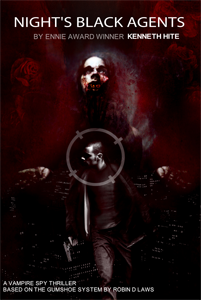The first question I tend to ask when faced with a new role-playing game is: why? Why does this game exist? What does it do that I can't do with my favourite existing role-playing system? And even the strapline on Night's Black Agents, "a vampire spy thriller" barks that question at the full moon. If you want a vampire spy thriller, surely something like Cthulhu or Dresden Files or even Shadowrun already fits the bill?
Reading the back and the introductory chapters goes a little way toward an answer, but not far. The game uses the Gumshoe system, and that means detective work works. One group of player skills, called investigative skills, automatically succeed if a player thinks to apply them. They can succeed or succeed especially well, garnering extra clues, so there's still tension. But this solves a fundamental problem with detective style games where all the players fail a vital skill check and miss a vital clue. With Gumshoe, you always get the basics, allowing the investigation to continue.
Existing Gumshoe games tend to focus on the detective work, pushing other mechanical aspects to the background. This combination makes it a great fit for horror games. We already have a couple in Trail of Cthulhu and the grim Esoterrorists. Night's Black Agents is different because the spies in this vampire spy thriller are all badasses. They're the Bonds, Bournes and Sydney Bristows of their world.
As a result, the game has much crunchier combat mechanics than other Gumshoe games. It also has a startling catalogue of skills and spy hardware, both violent and subtle, for the players to work with. It feels a much more well-rounded system as a result, and occasionally rises to almost cinematic fight sequences. But on the other hand the first casualty of all this action is the accessibility of the Gumshoe system. The group will have to work harder on the rules to get this off the ground.
Running the game is, at first, similarly opaque. The game's premise posits vampires and a conspiracy and there are chapters dealing with each. The vampire one is a smorgasbord of lore for vampire lovers, covering angles both ancient and modern. Your vampires can be traditional supernatural ones or aliens or the result of lunatic science. The conspiracy one goes into detail on how to structure the layers of a conspiracy and how to reveal them, one at a time, to the players via clues. It's all fantastic source material but it gives you nothing solid to work with. It's up to you to decide what the vampires are, how they work, how they hide and pull the strings. It's also up to you to spot any squares amid the circles and smooth them: if your vampires can reproduce, for example, why haven't they taken over the world?
At this point, you can answer the why question: Night's Black Agents seeks to do one very specific thing, and do it well. Sure you can play a vampire conspiracy game with Cthulhu or Dresden or Shadowrun, but it won't be as good as this vampire conspiracy game. This one balances investigative work and brutal gunfights and hi-tech hardware into one solid system. This one teaches you all you could want to know about vampires and the methods to keep them both powerful and secret. It's pushed itself into a small niche, but it's filled it impressively. And the more time I spend in that niche, the more interesting is becomes.
Consider: most horror games share a basic level of implausibility. If the world is full of a hundred different kinds of demons, ghosts or octopoid horrors from the nether realms, where do they all hide? Why don't they crush humanity like so many bugs? Why do the organisations that fight them go to such lengths to stay secret? The games we play offer various platitudes to these questions but as we play, we know the answers are a veneer. They're a prop to the suspension of disbelief we hold up so we can enjoy the game.
Night's Black Agents doesn't need to do any of that. There is one enemy: vampires. There aren't that many, but they're hideously powerful both individually and in the conspiracy they control. It posits a scenario that is believable and scary and then fulfills it in exceptional clarity. The system would work very well for any kind of high-octane action horror. It could even work as a traditional spy thriller, stripped of supernatural elements and with human antagonists. Indeed there are moments in the rules where it hints you could go either way if you wish. But doing so would lose the purity of the game, and that purity is what makes it special.
Lest you worry the focus is too narrow, Night's Black Agents turns its precise premise into a strength. Within its remit, it offers sidebars and options to tailor play toward any kind of secret agent sub-genre. You can make the game bleaker, more paranoid or more action-packed as your group desires. This might be a super-specific game but it does everything within its theme that you could want and does it well. So if a supernatural spy game appeals, it's worth your time. And if not, well, it might even convince you that there's more value to that idea than you thought. It did me.
 Games
Games How to resolve AdBlock issue?
How to resolve AdBlock issue? 





